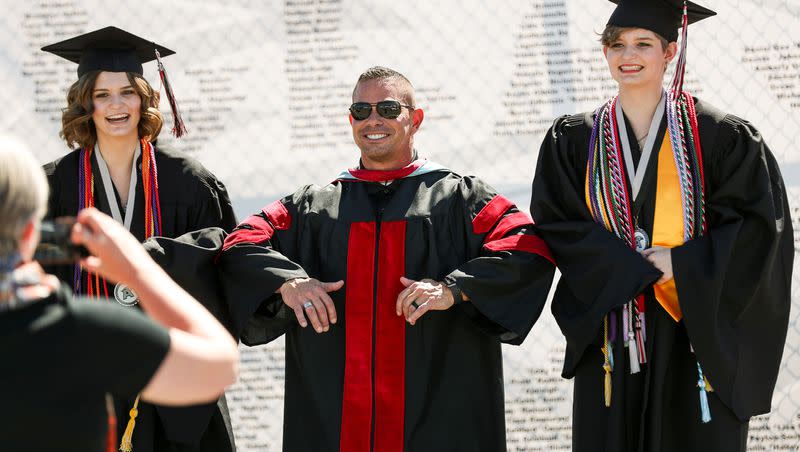Perspective: Preparing for adulthood? Practical advice for high school grads

’Tis the season for high school graduations. To you graduates, after yearbook signings, the pomp and circumstance that comes with that cap and gown and the senior parties, you will be stepping into adulthood. For some of you, that step might be a baby step and for some of you, a giant leap. To all of you, good luck!
I want to share some practical skills that can help you transition into adulthood more easily. I also don’t want you to feel overwhelmed — we are all still figuring things out, no matter what year we graduated from high school.
Hopefully, you have a solid work ethic. You’ll need it all of your life, from paid employment, to parenting to volunteer service and more. You probably have heard the saying “underpromise and overdeliver” — pretty good advice. Joseph Campbell, the man who said “Follow your bliss,” saw that some people took that to mean kick back and wait for good things to fall in your lap. Frustrated, he later said that what he should have said was, “Follow your blisters.” Life requires work. As with pretty much everything, though, this can be taken too far and turn you into a workaholic who ignores the people who matter most.
I hope you know the basics of car ownership, of doing laundry, of cooking, cleaning and plunging a toilet. I hope you know how to get a passport, mail a letter at the post office and open a bank account.
Related
Perspective: It’s been 2,197 days, and everyone still thinks I’m a real adult
Opinion: How to be an adult — when you don’t feel like an adult
I hope you’ve gained some management skills: time management, money management, stress management, emotional management and relationship “management.” Maybe your mom made sure you were out of bed and on time for school, or maybe you’ve already developed the skill of going to bed early enough to be able to get up on time. Being consistently late has real-world consequences — like getting fired from your job, or flunking your early-morning classes.
I know you’ve taken financial literacy classes before graduating. Now is the time to put what you’ve learned into action. Don’t spend more than you bring in, use a budget, start building credit and save for the future. Beware of debt, especially at this early age.
Managing stress is a skill that will benefit you your entire life. If you found healthy ways of coping in high school, great! If not, start now. You might find stress release through exercise, through journaling, through the practice of daily gratitude, through mindfulness and mediation and with supportive friends. If you’re headed off to college, most will have some type of assistance and training on managing stress. Also, don’t be afraid to talk to a therapist.
When I say “emotional management,” I am talking about being able to manage and regulate your own emotions. Do you know how to disagree without making it personal and hurling insults? How do you resolve conflicts? Do you hurl insults? Back down and give up? Be passive-aggressive? There are healthier ways. Do you know how to lose gracefully? What skills do you already use to calm down if you are angry? Hurt? Offended? Do you know how to take feedback from a boss? A teacher? A friend? A roommate you just met? Being an adult means you’ll get lots of practice in learning to manage your emotions.
Having healthy relationships means you know how to be a true friend, and how to have healthy boundaries. It means you know how to show respect to teachers, bosses and other leaders. It means you know how to keep social commitments (and by that I mean no ghosting!). It means you don’t bully or mock other people, either in their presence or not. Healthy relationships don’t just happen — they take work. Be a builder and a giver — and also don’t let yourself be taken advantage of.
I hope you’ve gained (or will work on) professional communication skills. Do you know how to write a professional cover letter for a job application? How’s your résumé? Can you put together a professional paper, without using texting acronyms and emojis? Can you work on a team and give feedback to team members? Do you know how to be a good digital citizen, meaning you have appropriate comments and conversations online? If you don’t already know, you should be aware that many employers will scour your social media posts before hiring you to see if you are a good fit for the company culture. Communication skills are fundamental to all aspects of your life.
I hope that you make service an integral part of your life. I know you don’t have time and you don’t have money — it doesn’t matter. Anyone can serve. In fact, Dr. Martin Luther King Jr. said that very thing: “Everybody can be great ... because anybody can serve. You don’t have to have a college degree to serve. You don’t have to make your subject and verb agree to serve. You only need a heart full of grace. A soul generated by love.”
Finally, I want you to know you don’t have to “have it all figured out” right now. Plan, move forward and know that life will bring many unexpected twists and turns. You’ve got this.
Holly Richardson is the editor of Utah Policy.

